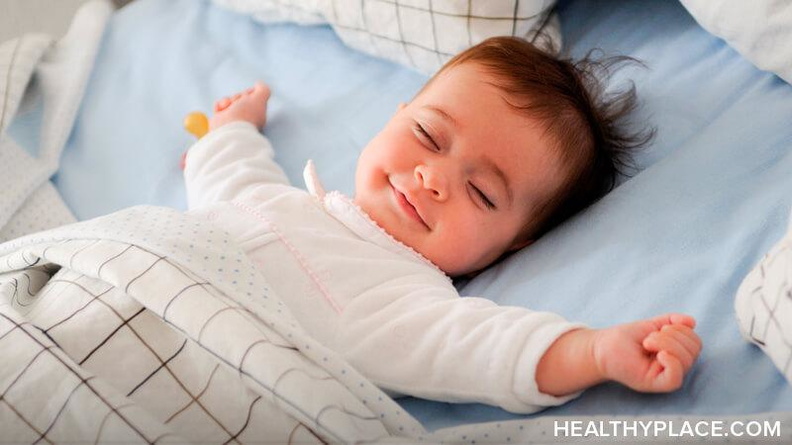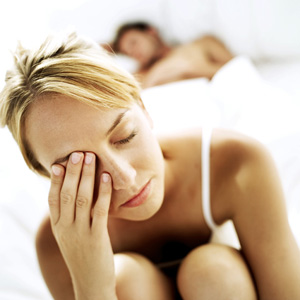How Sleep Impacts Your Self-Esteem

This is your wake-up call - literally. Running on too little sleep can have detrimental effects on your mind, body, and brain. For years we have known that sleep deprivation was bad for our mental and physical health and now more alarming research has linked lack of sleep to higher stress, low self-esteem, physical health issues, and even brain damage.
Sleep deprivation wears down our normal capacity to deal with daily aggravations and challenges, causing the cycle of stress to wear us down. One night of disrupted sleep lowers the threshold for "stress perception." When you're dead tired, or have had weeks of restless nights, just running an errand or responding to another email is overwhelming. Frustration and feeling frazzled makes you less capable and less effective in your day to day groove.
Even more concerning is how it affects one's brain over time. A study published this week in the Journal of Neuroscience found that staying awake kills brain cells in mice, and researchers suggest it may do the same in humans. It’s the first study to show that sleep loss can lead to irreversible damage.
 For many Americans it’s nearly impossible to get enough sleep. Not just because they can’t find the time, but their brains don’t shut off once they hit the sheets. Over-thinking about the day, being alone with your thoughts, and dreading another sleepless night or morning of grogginess all adds to the mix. Stress and hectic schedules make it hard to get the zzzs one needs. Over time, cortisol elevations cause shifts in other hormones (such as DHEA, estrogen, progesterone, and testosterone) as well depletion in neurotransmitters availability. This often leads to sleep cycle disturbances, which then causes more stress on the body and the cycle continues.
For many Americans it’s nearly impossible to get enough sleep. Not just because they can’t find the time, but their brains don’t shut off once they hit the sheets. Over-thinking about the day, being alone with your thoughts, and dreading another sleepless night or morning of grogginess all adds to the mix. Stress and hectic schedules make it hard to get the zzzs one needs. Over time, cortisol elevations cause shifts in other hormones (such as DHEA, estrogen, progesterone, and testosterone) as well depletion in neurotransmitters availability. This often leads to sleep cycle disturbances, which then causes more stress on the body and the cycle continues.
The Connection Between Self-Esteem and Sleep
Sleep deprivation increases your odds of feeling overly sensitive. The friend that doesn’t text back for hours may start to get under your skin, leading to feelings of fear or frustration, and more self-doubt. Add in more nights of sub-par sleep and you're set up to feel less connected to yourself, your goals, and more sensitive to the outside world.
Irritability becomes more prevalent. You have less patience for people, situations, and often act out or get angry at yourself for feelings frustration. Increased depression or sadness can develop with lack of sleep which often contributes to low self-esteem. Those who are already depressed or have other underlying mental health disorders may find those problems exacerbated by lack of sleep.
Relationship problems with friends or family can be challenged by lack of sleep. Letting little things get to you amplifies emotions that you normally would push away, making you less happy with yourself and a partner, which can create a major hit to your confidence.
7 Ways to get Good Sleep and Improve Self-Esteem
- Incorporate more breaks for mindfulness and gentle exercise to get your brain “reset." When you do this, the noise in your mind isn’t as amplified at night. It may seem “impossible” to break away from the daily grind but 5-10 minutes here and there have been shown to recharge your brain.
- Do any amount of mindfulness meditation every day. This can simply be sitting and observing your thoughts with a compassionate, non-judgmental attitude. HeadSpace and Zencast are websites that walk you through it.
 Decrease caffeine as it exacerbates anxiety and can create disturbances in your sleep patterns. If you drink coffee, tea, or soda and you have anxiety, consider getting off caffeine or stopping before noon. Coffee, tea, soda, energy drinks and chocolate, remain in the body on average from three to five hours but they can affect some people up to 12 hours later. Even if you do not think caffeine affects you, it may be disrupting and changing the quality of your sleep. If you need a pick me up around 3:00 p.m., refuel with food to bring your blood sugar back to normal.
Decrease caffeine as it exacerbates anxiety and can create disturbances in your sleep patterns. If you drink coffee, tea, or soda and you have anxiety, consider getting off caffeine or stopping before noon. Coffee, tea, soda, energy drinks and chocolate, remain in the body on average from three to five hours but they can affect some people up to 12 hours later. Even if you do not think caffeine affects you, it may be disrupting and changing the quality of your sleep. If you need a pick me up around 3:00 p.m., refuel with food to bring your blood sugar back to normal.- Wind down for one hour before bedtime. Ideally this would be unplugged, restorative time (e.g., relaxed reading, bath, or mediation practice) - something to induce the relaxation response. Sleep meditations are all over YouTube and can be listened to as you are lying in bed. Listen to a guided sleep mediation or hypnosis on YouTube or soothing music. Don’t use electronics, even the Nook, an hour before bed.
- Avoid TV, phone, tablet, emails, Netflix, Hulu, your Instagram feed, and video games in bed. The light and the activity stimulates neurotransmitter activity. Falling asleep with the TV on will disrupt your sleep cycle.
- Keep a worry journal next to your bed (pad of paper with a pen). If you have trouble falling asleep due to racing thoughts, write them down, thank your mind for reminding you about it, and tell your brain that you will address it tomorrow.
- Make your room hibernation friendly. A cool, cozy, and dark room makes your body go into hibernation mode. Make sure your bedroom is quiet and your comforters are comfy to help you feel relaxed when you climb into bed.
The more consistent your sleep cycle is the better you will feel. Don’t try and catch up on the weekend, which will just make it harder to adjust come Monday. Do try and keep your bedtime and wake time consistent. Keep track of your sleep cycle to see how you are doing and share with your doctor if you are having trouble.
How do you get a good night’s sleep? Have you noticed that disrupted sleep has hurt your self-esteem or made you more stressed? Comment on what has and hasn’t worked for you.
Take Good Care.
Emily is the author of Express Yourself: A Teen Girls Guide to Speaking Up and Being Who You Are.You can visit Emily’s Guidance Girl website. You can also find her on Facebook, Google+ and Twitter.
APA Reference
Roberts, E.
(2014, April 4). How Sleep Impacts Your Self-Esteem, HealthyPlace. Retrieved
on 2024, April 28 from https://www.healthyplace.com/blogs/buildingselfesteem/2014/04/how-sleep-impacts-your-self-esteem
Author: Emily Roberts MA, LPC
I am suffering a very poor sleep from childhood , that impacts me a lot in my life, I took several pills to get sleep, but none works.. after I identify I have lack of confidence in myself.. especially at work places… I am trying to be perfect and hard work at work places … but other staffs trying to find my mistakes and laugh at me … that thinking leads poor sleep and body ache… very low self esteem , how can I overcome these
Thank you for choosing HealthyPlace! I can appreciate the challenges with sleep. Due to a severe back injury, I have seen my fair share of sleepless nights. I agree that poor sleep can adversely impact your self-esteem. I encourage you to continue browsing through HealthyPlace to find more quality articles that may help. I have come to realize that poor sleep is often systemic. That is, it arises from a complex mix of factors and in turn affects us in complex and subtle ways. I can only speak from personal experience, but I have found that acupressure "seeds" placed on specific points under my ears really helps improve my sleep. I encourage you to consult with a licensed acupuncturist and ask them about acupuncture/acupressure seeds if what I am saying resonates with you. Good luck in your journey toward better sleep and overall improved quality of life.
I have had problems with sleeping for years and it has gotten so bad I will cry for no reason it at yelling at my family I feel like I'm losing my mind.please help
Hi Joyce,
I'm really sorry to hear that. Not sleeping really takes a toll on our lives. It's hard knowing that while everyone finds sleeping easy as just putting your head on the pillow or a magical calming method many yearn to dream for that experience. It feels like you cannot go on anymore with the pressing pressure. Joyce, I'm really happy for you that you actually came here to address your problems. It may seem like nothing is going well and everything is falling apart but just know this at the end of every storm there's always rain or sunshine... I'll even be volunteering to be your own chatting mate if you want. I am here for you anytime if you're up for a convo. Did you try addressing the problem with your family? Please do not give up, it's pretty brave of you to point your problem out here. It takes a lot of mustered courage to do that, to embark on a journey to tackle and attempt to deal with out problems. So don't end your journey here, keep going, look for people to guide you- this might be your parents, family members, professional health assistants or even close friends.
Your words really resonated with me. I have a dad who doesn't sleep even if he takes his medications which then causes him to be all hostile, distant and on edge around us. Though with all these feelings, he is the most kindest genuine people I know. I don't blame him anymore, rather I feel more connected with him as he gives the best honest life advices. This is also because he explained to me the effects it has on him and the guilt he has. I feel like these problems are all just to test our mental strength and capacity, to see who really is at good heart. Just like one great person who said "The kindest of hearts felt the most of pain."
Hold on there, Stay Strong Joyce!
Hi Joyce,
So sorry to hear you've been experiencing this. Take it day by day, trying each day to do one little thing to improve sleep. This could be as simple as putting your phone away a bit earlier than usual before going to bed. I understand from personal experience how poor sleep can affect mood and behaviour towards people. Don't be too hard on yourself about it. Over time, you can build healthy habits that will help you sleep better and feel more like yourself.
Take care,
Sam
Thank you for this great article, Emily. Hadn't realised there is such a link between sleep and self esteem. Your article puts it in words very clearly and succinctly. Saved it as a favourite straight away!
Hi Steven, Thanks for writing, glad you found this helpful and hope that you have a great night's sleep :)
An absolutely fabulous article.
Explains reasons and help/information.
Thank you
This is a fabulous article. Thank you for selflessly contributing self esteem building tips, tools and facts with us all.
With love, light and confidence,
Dr. Simone Alicia, The Self Esteem Doctor
Thank you Dr. Alicia! Thanks for reading I hope to learn more about you too!
Emily Roberts
Really nice and informative article! I can definitely relate to the very negative consequences of sleep difficulties and being oversensetive to social matters, among a lot of other issues.. This can easily affect your self-esteem, no matter how confident you actually are. In my experience, when I have had even the slightest lack of sleep or had so called non-restorative sleep, for days or weeks, it feels like all your emotional barriers are non-existent.. The world becomes colorless, and everything seems grey.. It's a very bad state to be in - and I am very resilient and confident guy, but not when I've had difficulties sleeping.

